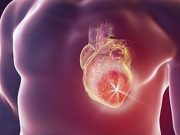Tag: Heart / Stroke-Related: Heart Attack
MI Classified Into Four Stages Based on Myocardial Tissue Injury
Four stages of progressively worsening myocardial tissue injury described
Adjunctive Tongxinluo Therapy Aids STEMI Outcomes
Benefits of the traditional Chinese medicine compound seen for clinical outcomes at both 30 days and one year
Stress, Depression Common Among Women With Myocardial Infarction
Stress levels higher in women with MI and obstructive coronary artery disease versus MI with nonobstructive coronary arteries
Hospitals Struggling to Reach Time-Related Treatment Goals for STEMI
Authors say pandemic-related issues, including staffing, pose challenges
Hospital COVID-19 Burden Impacted NSTEMI Treatment, Outcome
Outcomes and treatment worse for patients hospitalized during weeks with a high hospital COVID-19 burden
Many Heart Attack, Stroke Survivors Do Not Know Their Cholesterol Levels
American Heart Association says knowing levels is key to preventing recurrent heart attack, stroke
ESC: Adverse Outcomes Increased With Suboptimal Adherence to Aspirin After MI
Risk increased for recurrent MI, ischemic stroke, or death with suboptimal adherence through eight years after MI
ESC: Recurrent Myocardial Infarction Often Unrecognized
Most patients recognize chest pain as MI symptom, but less than one-third recognize cold sweating, shortness of breath, radiating pain
Pain at One Year Post-MI Linked to Increased Risk for Mortality
Hazard ratios were 1.35 and 2.06 for moderate and extreme pain measured at one year after hospital discharge
Exposure to Extreme Temperatures, Pollution Linked to MI Death
Study reveals significant synergistic interaction of heat wave and PM2.5 on myocardial infarction mortality














